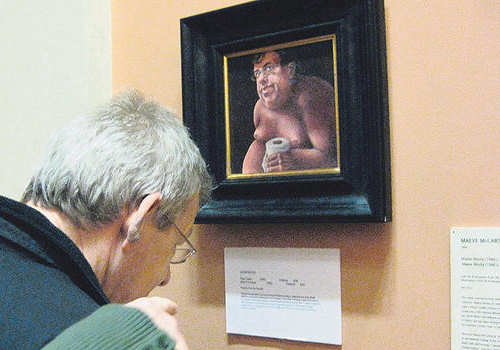A very interesting story about Government censorship has been unfolding in Ireland over the last two days. Indeed, if not for the Internet then the story would have been successfully squashed by now!
It all started with a practical joke in which paintings of the Irish Prime Minister, who was naked, were hung in two popular art galleries in Dublin. The national broadcaster RTE provided coverage of the story.
Here is a screenshot of one of the paintings in case the video gets removed:

Painting of Brian Cowen (From RTE News)
Initially this was just an example of Irish humour, but it quickly took a sinister tone. First RTE was pressurised into removing the video from its web site, and it was subsequently forced to issue the following apology:
The Government then continued to flex its muscles today by sending the police into a radio station that covered the story. The police were demanding the name of the artist. More information about this can be read in Gardaí visit radio station in Cowen painting inquiry.
The police identified the artist in one of the fastest investigations ever undertaken, and they are currently preparing a prosecution. The police also seized five other similar paintings. More details of this are described in Teacher questioned over Cowen paintings.
My opinion on all of this is that it is outrageous that the Government is putting so many resources into trying to bury this story. I am also delighted with the responses of the online community, and I hope to play my part also :o
I am also really surprised that the Governemnt, or even the Prime Minister, did not seize the opportunity to turn it into good publicity.
For more coverage of this story from the Irish blogging community take a look at the recent posts by Maman Poulet, Damien Mulley, and Caricatures Ireland. This last web site has a very good caricature in The Taoiseach has no clothes and RTE has no balls: the Brian Cowen Nude Caricature.

Brian Cowen Caricature (Copyright Caricatures Ireland)
The t-shirt version of it looks great in Get your b*ll*ck-naked T*oiseach t-sh*rt.
I also think that this is yet another example of how a small story becomes a huge story when somebody tries to censor it! A perfect example of this is all of the other caricatures that are now appearing on the Internet, such as the caricatures in Photoshop Cowen extravaganza. I think that some of these are very funny, while others are not. However, I think it is vital in a democracy that they are all available to the public!
I have been following this story, and the associated outrage, all day on Twitter. I must admit that I really liked the real-time nature of this, although it was a distraction :o
It is also very interesting to see how the global media is covering this story. The story is covered in the UK in Naked taoiseach paintings removed, Cowen artist ‘could be charged’, and Guerrilla artist hangs nude paintings of taoiseach Brian Cowen. France is reading about the story in A poil, par Robert Solé, and the US is reading about it in Ireland: Nude Premier Paintings Appear. Perhaps the most ironic, or even worrying, coverage is by the Chinese in Naked Irish PM portraits removed. I am sure that it is also being covered by many other news agencies of which I am not aware!
The story has also made it into Wikipedia, where it is known as Picturegate. Perhaps the Irish Government will try to remove this next!
I wonder how this story will continue in the following days!
Tags: Censorship, Damien Mulley, France, Ireland, RTE, Twitter, UK, Wikipedia



